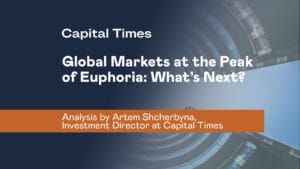Global stock markets continue to break records, reaching multi-year highs while investors seem indifferent to geopolitical tensions. But how long can this euphoria last? Artem Shcherbyna, Investment Director at Capital Times, shares his insights on the main risks for global financial markets, the potential “AI bubble,” and whether global corrections could affect Ukraine.
Market Euphoria: How Long Can It Last
In recent months, stock markets have been in a state of overwhelming optimism. Announcements of new U.S. tariffs on Chinese imports, rising tensions in Ukraine and the Middle East, or financial troubles among U.S. regional banks barely move the markets.
From May to October 2025, the S&P 500 index surged by 25%, while its historical annual growth rate is about 10%. This is a classic example of market euphoria.
“Look at the queues for gold bars in Australia, Japan, or the U.S. When every taxi driver is convinced that an asset can only rise, it’s a signal that smart money has already become the seller,” — says Artem Shcherbyna.
According to him, a market correction is inevitable. And the higher the indices climb, the smaller and more unexpected the trigger for a downturn may be — from a technical glitch on the exchange to a social media post by Donald Trump announcing new tariffs.
The AI “Bubble”: A Déjà Vu of the 2000s
Today’s market situation is increasingly compared to the dot-com boom of the early 2000s. Then, as now, market growth was fueled by a technological revolution.
The main beneficiaries of the current boom — semiconductor manufacturers — are already showing signs of slowdown. For instance, Taiwan Semiconductor reported a 1.8% revenue increase in Q3 2025 compared to Q2, while the same period last year showed 14% growth. Yet, stock prices remain near all-time highs.
Another interesting aspect is how tech giants reinvest among themselves:
“OpenAI raises billions from Nvidia, Oracle, and Microsoft — and these same companies become its partners in projects. It creates great headlines but adds little real value to the economy in the short term,” — explains Shcherbyna.
Thus, the market already shows signs of overheating, but euphoria can persist for a long time. Predicting the timing or nature of a downturn is impossible.
Cryptocurrency Volatility: Painful Only for the Overleveraged
On October 10, the cryptocurrency market experienced a significant drop. For some investors, it was “the biggest collapse in history.” However, according to Artem Shcherbyna, for rational investors, it was just typical volatility.
“Those who used leverage or invested in risky altcoins lost 50–90%. But for those who invested prudently, it was merely noise,” — he explains.
As for broader risks, he emphasizes that the global financial system faces minimal or no threat. Some crypto-oriented companies may go bankrupt — and perhaps even El Salvador, which manages its budget in Bitcoin — but no global shock is expected.
Could a Global Market Correction Affect Ukraine?
While stock markets reflect the state of the global economy, Ukraine is currently only loosely integrated into global financial processes.
“About 60% of Ukraine’s GDP consists of government spending, primarily on defense. The share of financial markets, AI technologies, or innovation is below 1%,” — notes Shcherbyna.
Ukraine also lacks a developed stock market and rarely issues eurobonds. Therefore, even a deep correction in the U.S. or Europe would have minimal direct impact.
As for Western support — it’s driven by security, not markets:
“Support for Ukraine is a matter of defending Europe, not investor sentiment. Even a severe correction won’t alter the political will to help Ukraine,” — says Shcherbyna.
Key Risks for Global Financial Stability
According to Artem Shcherbyna, several key risks could disrupt the balance of the world economy:
- Overheating in the tech sector, especially in AI;
- Geopolitical risks, from Taiwan to the Middle East;
- Financial fragility of regional U.S. banks;
- Rising cost of capital, which could cool investment activity.
Still, none of these risks currently signal an imminent global crisis.
Conclusion
Global markets are in a phase of euphoria, with investors often ignoring real risks. A correction is only a matter of time — though predicting when or how it will occur is impossible. Meanwhile, Ukraine, being largely insulated from global financial dynamics, is unlikely to feel significant effects.
Author: Artem Shcherbyna, Investment Director at Capital Times









